Not to be confused with BBQ charcoal, activated charcoal is an incredibly adsorptive material that can bind to pathogens, gases, and chemicals.
This property gives it many uses, from treating tooth infections to purifying water. But, with so many brands of activated charcoal on the market, how are you supposed to know which one is best?
Here’s the definitive answer on which activated charcoal is best, including why coconut shell-activated charcoal is better than hardwood.
I’ll also go into detail about choosing activated charcoal, reviewing properties like surface area, pore size, ash content, particle size, iodine number, and more.
At a Glance: Best Activated Charcoal Brands
- Best overall: Charcoal House Health powdered activated charcoal – Check on Amazon
- Best for topical use: Coal-Conut powdered activated charcoal – Check on Amazon
- Best granular: Envirosupply granular activated charcoal – Check on Amazon
- Best capsules: Nature’s Way activated charcoal capsules- Check on Amazon
Best Brands of Activated Charcoal
When choosing the best brands of activated charcoal, I looked at factors like coconut or hardwood-based, how much lab testing information they reveal, surface area, iodine number, ash content, mean particle diameter, and where the activated charcoal is made.
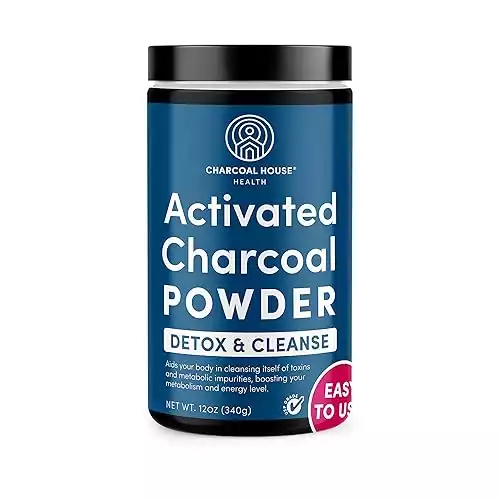 Coconut Activated Charcoal Powder by Charcoal House
Coconut Activated Charcoal Powder by Charcoal House
Choose because: Very pure and highly adsorptive
- Derived from: coconut
- Surface area: 1600 m2/g
- Iodine number: 1500
- Acid soluble ash: 1%
- Mean particle size: 8-15
This is one of the few brands of activated charcoal that shares info about the quality of their products on the actual label. It’s unsurprising that they share this info since the quality is impressive.
The surface area of 1600 m2/g and iodine number of 1500 is much higher than most other brands – this product should do a much better job of adsorbing impurities such as chemicals.
It’s also a pure activated charcoal product with 1% acid-soluble ash. This is particularly important if you want activated charcoal for beauty or internal detoxes.
The downside is that this activated charcoal isn’t cheap. The largest container is only 24oz, so you won’t even save money by buying in bulk.
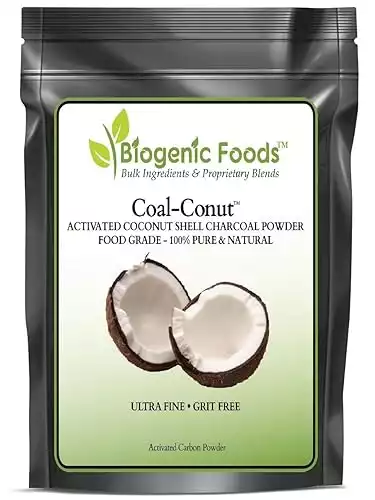 Coal-Conut - Activated Coconut Shell Charcoal
Coal-Conut - Activated Coconut Shell Charcoal
Choose because: Very fine grain is excellent for poultices, salves, face masks, and teeth.
- Derived from: coconut
- Iodine number: 1250
- Mean particle size: 7
While this brand of activated charcoal isn’t as well-known as others, it is a high-quality product derived from coal. The brand lists the iodine number as 1250, which means it has a high adsorptive ability. The ash content isn’t listed, but it should be pure as the product is made from coconut shells.
The property that makes this activated charcoal stand out from other brands is the tiny mean particle size of just 7 microns. It feels like talcum powder and is great for external use on skin. Of course, you can still use it internally.
This product is affordable considering the quality and is available in various bulk sizes.
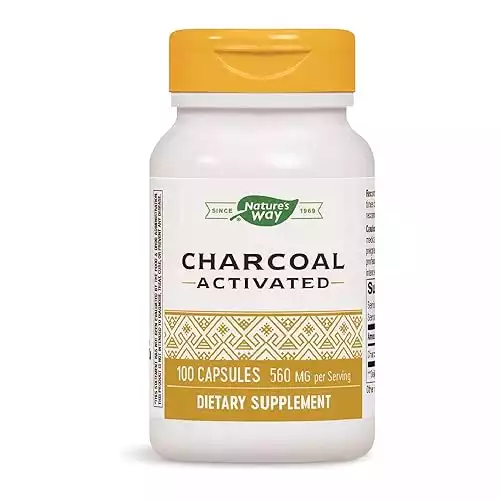 Nature's Way Activated Charcoal Supplement
Nature's Way Activated Charcoal Supplement
Choose because: Quality coconut activated charcoal capsules made in the USA.
- Derived from: Coconut
- Amount per capsule: 280mg
- Capsules per bottle: 100
Nature’s Way is a reputable brand that makes supplements in the USA. Their activated charcoal is incredibly popular. It contains only activated charcoal from coconut shells and no additives or fillers like many other brands of capsules do.
Note the Amazon description and label for this product are a bit confusing. A jar contains 100 capsules. A serving contains 560mg. However, upon closer inspection, you’ll see that a serving is two capsules. So, each capsule contains 280mg. Honestly, that’s on par with all activated charcoal capsules. If you were to fit 560mg of AC into one pill, it would be huge and hard to swallow.
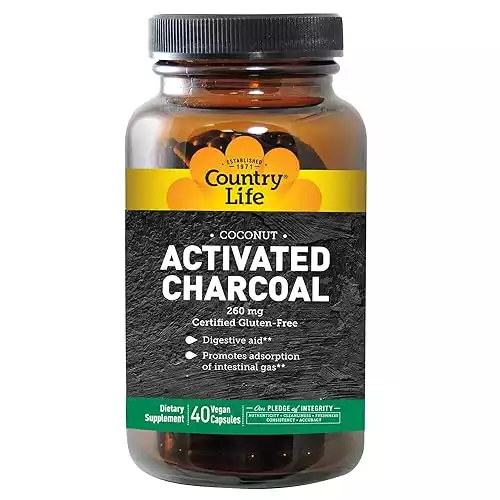 Country Life Natural Charcoal Capsules
Country Life Natural Charcoal Capsules
Chose because: Activated charcoal capsules, which are vegetarian-friendly
- Derived from: Coconut
- Amount per capsule: 260mg
- Capsules per bottle: 100
Country Life is one of my favorite brands for supplements. Almost all of their supplements are made in the USA and they are committed to sustainability. They are high-quality and, just as importantly, of consistent quality.
Unfortunately, I couldn’t find lab testing info for their activated charcoal. I did find that it’s made from coconut, which means it probably has a low ash level and is effective at adsorbing. It’s very finely ground, so you could open the capsules and use this AC for salves or face masks and take it internally.
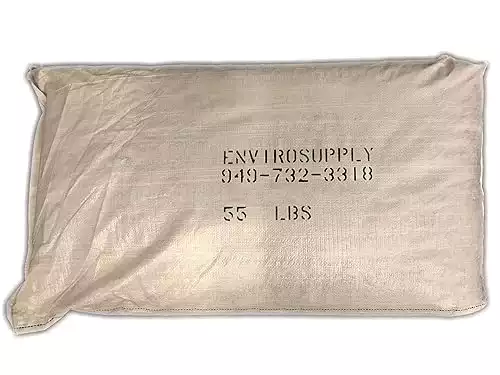 EnviroSupply Granular Activated Charcoa
EnviroSupply Granular Activated Charcoa
Choose because: Very affordable granular bulk AC and decent quality
- Derived from: coconut
- Iodine number: 1100
- Total ash: Max 4%
- Particle size: 6mm to 2.3mm
EnviroSupply makes granular activated charcoal for aquariums, but it has been tested to meet food-grade standards. Because it is granular, you won’t be able to use it for topical uses like salves. However, it is great for making your own water filters or other emergency uses.
One thing that stands out with this brand of activated charcoal is that they list their product’s laboratory info. The iodine number is 1100, which means it has good adsorption abilities.
The ash is a bit high (still better than most hardwood-activated charcoal), and the pH is higher (less acidic) than human skin. Still, you probably aren’t going to use granular activated carbon on your skin anyway.
The EnviroSupply activated carbon is available in bulk packaging for very good prices. It’s a good option if you want lots of AC on hand for purifying water (such as in emergencies) but don’t want to spend a fortune.
What Is Activated Charcoal?
Also known as activated carbon, activated charcoal is a highly porous material. It is made by taking a carbon material (such as wood) and burning it in an oxygen-less environment to produce charcoal. The charcoal is processed further to remove impurities, increase surface area, and reduce pore size.
Read:
Choosing Activated Charcoal
You can’t tell the quality of activated charcoal by looking at it. Rather, the best brands of activated charcoal test their product using the ASTM International testing process. Good brands will publish the results of these tests, such as on the label or their Amazon page.
Below are the most important properties to look for when choosing a brand of activated charcoal.
Surface Area of Activated Charcoal
One of the properties that make activated charcoal so effective in adsorbing impurities is its high surface area. Activated charcoal is made of such tiny pieces that just a single spoonful can have a football field’s surface area. Generally, the higher the surface area, the more impurities the activated charcoal will adsorb.
Typically, activated charcoal will have a surface area of 800 to 1,200 meters squared per gram (m2/g). Some “super activated” charcoal have surface areas of up to 3,500 m2/g.
Unfortunately, most brands of activated charcoal don’t list their surface area. Look for brands that do share this information, as it is a sign of a good quality product.
Activated Charcoal Pore Size (Porosity)
The other most important feature of activated charcoal is pore size. Adsorption only occurs when the pore size is slightly larger than the absorbed molecules. Thus, the pore size of the activated carbon must match the size of what you want to absorb.
For example, some cheap brands of activated charcoal are made in a way that produces large pores. These pores would absorb large impurities (such as algae in water). They would not effectively remove smaller impurities such as volatile chemicals or viruses.
Activated charcoal pores are divided into three sizes:
- Micro pores: Less than 2 nanometers
- Meso pores: Range from 2-50 nanometers
- Macro pores: Range from 50 to 2,000 nanometers
In general, you want activated charcoal with a high amount of micropores. These will most effectively trap gases, bacteria, mold, toxins, and chemicals. The pore size (as well as properties like pore volume and radius) vary depending on how the activated charcoal was made.
Activated charcoal made from coconut shells usually has more micropores than other types of activated charcoal, which is one reason why coconut shell-activated charcoal is considered best (more on that later). (1)
Ash Content of Activated Charcoal
Ash is what is left over after activating the charcoal. These ashes can include minerals, aluminum, and sand. You do not want a lot of ash in your activated charcoal; the ash can reduce effectiveness and leach unwanted substances.
Sometimes activated charcoal brands list their total ash content. However, soluble ash content is more important, as this indicates how much ash will leave the activated charcoal in water or acid.
Typical ash levels:
- Coconut shell activated charcoal: 2-3%
- Hardwood activated charcoal: 5-15%
- Coal activated charcoal: 8-15%
(4)
Mean Particle Diameter (Fineness)
Activated charcoal is classified by how finely ground its particles are.
The fineness is measured as mean particle diameter (mpd). While there might be some larger and smaller particles in the activated charcoal, the number gives you a good idea of how fine or coarse the product is.
Fine-grain activated charcoal is better for topical uses like skin masks.
Coarser activated charcoal is abrasive, so not ideal for topical use. However, it is a good choice for DIY water filters because the larger particles are less likely to leak through the filter medium.
*Sometimes “mesh size” is used instead of mpd – a higher mesh size = a smaller mean particle diameter.
Activated charcoal fineness:
- Fine: Below 15 microns (less than 800US mesh)
- Medium: 15-30 microns (800 to 490US mesh)
- Course: 30-45 microns (490 to 325US mesh)
- Granular: 45 to 180 microns (325 to 80US mesh)
Iodine Number
Another number you will see listed on good brands of activated charcoal is the iodine number. This measures how much iodine 1 gram of the activated carbon can absorb when the iodine concentration is 0.02N. The iodine number gives a good indication of how “active” a particular AC product is. Typical activated charcoal products have iodine numbers ranging from 600 to 1100.
As a general rule, a high iodine number indicates good-quality activated charcoal that will be better at adsorbing small particles. However, remember that activated charcoal can only adsorb materials slightly smaller than its own pore size. Just because the AC adsorbs lots of iodine doesn’t mean it will adsorb the impurity you want to remove. (8, 10)
Powdered vs. Capsule Activated Charcoal
Powdered activated charcoal is generally cheaper per gram of product. It is also more versatile as you can use it externally, internally, or for things like DIY water filters. However, capsules are much more convenient if you primarily want to use activated charcoal for stomach bugs, gas, or other internal uses.
I keep some bulk activated charcoal at home for poultices and have some activated charcoal capsules in my first aid kit.
Wood vs. Coconut Activated Charcoal
Activated carbon is usually made from coal, wood, or coconut shells. Coal-derived activated carbon tends to be very ashy and doesn’t adsorb as well. Thus, the best materials for activated charcoal are hardwood and coconut. Of the two, coconut is usually better because it has more micropores and less ash.
Hardwood Activated Charcoal
To make hardwood activated charcoal, hardwood trees are cut down, pulverized, and turned into activated charcoal with chemicals (usually phosphoric acid or zinc chloride are used).
The process creates activated charcoal with larger pores (meso pores). This means hardwood-activated charcoal is good at removing large impurities, such as ones that cause bad tastes or odors in water. It won’t be as effective in removing small chemicals or other tiny impurities.
The chemical activation process also leaves more residual ash in the finished AC. Expect hardwood-activated charcoal to have at least 5% ash content.
Another issue is that hardwood-activated charcoal is fairly soft. When used for water filters, it can wear down fairly quickly.
Pros
Larger pores make it effective for removing larger impurities
Good at removing bad tastes from water
Cons
Not many micropores; won’t remove small impurities
Higher amount of ash
Some heavy metal residue
Trees must be cut down to make
Soft; will wear down fairly quickly
Coconut
Activated charcoal from coconut is made with a different activation method than hardwood. The technique often involves steam instead of just chemicals. This process creates more small micropores: 85-90% of coconut AC is micropores. The micropores mean coconut AC better absorbs small impurities – including volatile organic chemicals –.
The activation process also means less ash is left in the final AC. Less ash means purer activated charcoal. The final product is much harder and more durable than hardwood AC.
Another reason to choose coconut-activated charcoal is that coconut shells are a renewable resource; no trees need to be killed.
Pros
Mostly made of micropores
Micro pores can remove tiny impurities, including chemicals
Less ash and impurities in final product
Almost no heavy metal residue
Renewable resource
Very hard; won’t wear away quickly
Cons
Not as effective at removing large impurities
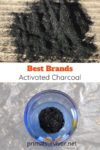


Great article. Thank you so much for the info!
One question: does the a.c. remove iodine from the body, or supply iodine to the body?
I am new to the subject and found this very informative. It was well organized, elegantly written and easy to understand. thanks so much for explaining the mechanics of what makes a good activated charcoal.
Would be nice to know how to use for feral cats with infections.